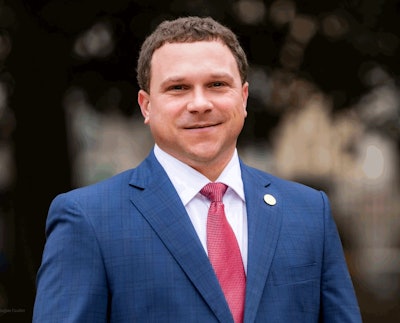
When the presence of highly pathogenic avian influenza (HPAI) is confirmed in a flock of birds that the World Organisation for Animal Health (WOAH) defines as poultry, that generally means trade restrictions for the state, or more localized region within the state.
But WOAH’s definition of poultry is too broad, says the agriculture commissioner for the largest broiler producing state in the U.S.
Georgia has not had any flocks of what most people would consider commercial poultry struck by HPAI during the 2022-24 outbreak. Yet a single outbreak in a commercial raised for release waterfowl flock in 2023 has cost the state dearly.
Georgia Agriculture Commissioner Tyler Harper estimates that trade restrictions put in place because those waterfowl were defined as commercial poultry by WOAH resulted in a loss of $300 million to Georgia poultry producers.
“As the nation’s leading poultry producing state, WOAH’s overly broad definition of poultry has negatively impacted Georgia poultry producers and the thousands of Georgians who make their living in our poultry industry for too long,” Harper said in a press release.
“Simply put, WOAH’s current position than an HPAI detection in birds raised for release on hunting preserves or a backyard poultry flock should trigger the same response as a detection in a commercial operation defies logic.”
Harper isn’t the first public official to push for a new WOAH definition for poultry. In fact, in his release, he referenced a bipartisan group of U.S. senators and representatives from an array of states who did just that in May.
Then, 58 federal lawmakers wrote to United States Department of Agriculture (USDA) Animal and Plant Health Inspection Service (APHIS) Administrator Dr. Michael Watson, urging the agency to advocate for WOAH to adopt the same definition of poultry that was unanimously approved by the United States Animal Health Association.
Those from Georgia to sign the letter included Reps. Andrew Clyde, Sanford Bishop, Rick Allen, Buddy Carter, Mike Collins, Drew Ferguson, Marjorie Taylor Greene, Barry Loudermilk, Lucy McBeth, Rick McCormick, Austin Scott and David Scott.
Why a new definition makes sense
I fully agree with Harpers and those who previously signed that letter. A new definition is needed, and the economic loss experienced in Georgia is only one of the reasons. Each time a similar detection in a flock that meet’s WOAH’s description of poultry but the definition of most other people, an export freeze is put in place for that geographical area. And it also puts importers of poultry in an undesirable position to have to seek poultry from other regions or markets.
When backyard poultry or commercial gamebirds are infected with HPAI, they obviously need to be depopulated and disinfection must be done, among other routine biosecurity measures. But that does not mean that commercial poultry by most people’s definition is any less safe.
And that is largely because of the biosecurity practices that are in use in Georgia and other poultry producing states.
“In Georgia and across the country, backyard flocks and birds raised for release commonly interact with wild birds potentially carrying the HPAI virus, putting them at greater risk of exposure to HPAI than poultry raised by commercial operators who follow strict biosecurity protocols to protect their flocks, Georgia State Veterinarian Janemarie Hennebelle said.
“The effectiveness of strict biosecurity protocols speaks for itself as only 30,000 birds in Georgia have been affected by the ongoing H5N1 outbreak that has affected more than 90 million birds across the country. I firmly believe that Georgia poultry exports can and should proceed unimpeded in the event of a detection in a backyard flock or birds raised-for-release and fully support this effort.”
View our continuing coverage of the global avian influenza situation.
To learn more about HPAI cases in commercial poultry flocks in the United States, Mexico and Canada, see an interactive map on WATTPoultry.com.



















